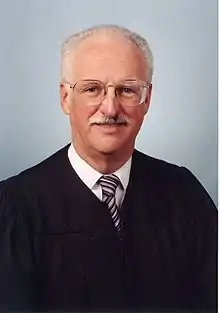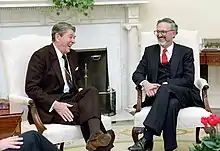Douglas H. Ginsburg
Douglas Howard Ginsburg (born May 25, 1946) is an American jurist and academic who serves as a judge on the United States Court of Appeals for the District of Columbia Circuit. He was appointed to that court at age 40 in October 1986 by President Ronald Reagan, and served as its chief judge from July 2001 until February 2008. Ginsburg was nominated by Reagan to fill a U.S. Supreme Court vacancy after the retirement of Lewis F. Powell in October 1987,[1][2] but soon withdrew from consideration after his earlier marijuana use created controversy.[3][4][5]
Douglas H. Ginsburg | |
|---|---|
 | |
| Senior Judge of the United States Court of Appeals for the District of Columbia Circuit | |
| Assumed office October 14, 2011 | |
| Chief Judge of the United States Court of Appeals for the District of Columbia Circuit | |
| In office July 16, 2001 – February 11, 2008 | |
| Preceded by | Harry T. Edwards |
| Succeeded by | David B. Sentelle |
| Judge of the United States Court of Appeals for the District of Columbia Circuit | |
| In office October 14, 1986 – October 14, 2011 | |
| Appointed by | Ronald Reagan |
| Preceded by | J. Skelly Wright |
| Succeeded by | Cornelia Pillard |
| Personal details | |
| Born | Douglas Howard Ginsburg May 25, 1946 Chicago, Illinois, U.S. |
| Education | Cornell University (BS) University of Chicago (JD) |
Ginsburg took senior status at age 65 in October 2011, and joined the faculty of New York University School of Law in January 2012.[6] In 2013, he left NYU and began teaching at George Mason University's Scalia Law School. He is the author of numerous scholarly works on antitrust and constitutional law.[7]
Early life
Born in Chicago, Ginsburg is the son of Katherine (née Goodmont) and Maurice Ginsburg.[8] He graduated from The Latin School of Chicago in 1963, then attended Cornell University. After dropping out in 1965 due to "boredom", he invested in and helped run Operation Match, an early computer dating service based in Boston. Returning to Cornell in 1968 after selling the company, Ginsburg received his Bachelor of Science degree in 1970.[9][10]
After graduating from Cornell, Ginsburg attended law school at the University of Chicago, where he was a member of the University of Chicago Law Review along with future judge Frank Easterbrook. He graduated in 1973 with a Juris Doctor and membership in the Order of the Coif. Ginsburg then clerked for Judge Carl McGowan on the U.S. Court of Appeals for the D.C. Circuit, and then for U.S. Supreme Court Justice Thurgood Marshall.[11]
Teaching and other public service experience
From 1975 to 1983 Ginsburg was a professor at Harvard Law School. From 1983 to 1986, he served in the Reagan administration, as Administrator of the Office of Information and Regulatory Affairs, in the Office of Management and Budget, and as Deputy Assistant Attorney General and Assistant Attorney General in the Antitrust Division of the Department of Justice. From 1988 until 2008, he was an Adjunct Professor at the George Mason University School of Law in Arlington, Virginia, where he taught a seminar called "Readings in Legal Thought."[12] Until 2011 he was also a Visiting Lecturer and Charles J. Merriam Scholar at the University of Chicago Law School in Chicago, Illinois. Ginsburg has been a visiting professor at Columbia University Law School (1987–1988) and a visiting scholar at New York Law School (2006–2008). He is currently a Professor of Law at George Mason University and a Visiting Professor at the University of London, Faculty of Laws.[13] He serves on the advisory boards of the Global Antitrust Institute (Chairman), the Jevons Institute for Competition Law and Economics and the Centre for Law, Economics, and Society, both at University College London, Faculty of Laws; Competition Policy International; Journal of Competition Law & Economics; Journal of Law, Economics & Policy; Supreme Court Economic Review; University of Chicago Law Review; and the Harvard Journal of Law & Public Policy.
Federal judicial service
Ginsburg was nominated by President Ronald Reagan on September 23, 1986, to a seat on the United States Court of Appeals for the District of Columbia Circuit vacated by Judge J. Skelly Wright. He was confirmed by the United States Senate on October 8, 1986, and received commission on October 14, 1986. He served as Chief Judge from 2001 to 2008. He assumed senior status on October 14, 2011.
He was a member of the Judicial Conference of the United States, 2001–2008, and previously served on its Budget Committee, 1997–2001, and Committee on Judicial Resources, 1987–1996; American Bar Association, Antitrust Section, Council, 1985–1986 (ex officio), 2000–2003 and 2009–2012 (judicial liaison); Boston University Law School, Visiting Committee, 1994–1997; and University of Chicago Law School, Visiting Committee, 1985–1988.
United States Supreme Court nomination

On October 29, 1987, President Reagan announced his intention to nominate Ginsburg to the Supreme Court of the United States to fill the vacancy created by the retirement of Lewis Powell,[1][2] which had been announced on June 26.[14] Ginsburg, age 41, was chosen after the United States Senate, controlled by Democrats, had voted down the nomination of Judge Robert Bork after a bruising confirmation battle which ended with a 42–58 vote on October 23.[15]
Ginsburg's nomination collapsed for entirely different reasons from Bork's rejection, as he almost immediately came under some fire when NPR's Nina Totenberg[16] revealed that Ginsburg had used marijuana "on a few occasions" during his student days in the 1960s and while an assistant professor at Harvard in the 1970s. It was Ginsburg's continued use of marijuana after graduation and as a professor that made his actions more serious in the minds of many senators and members of the public.[17] Ginsburg was also accused of a financial conflict of interest during his work in the Reagan Administration, but a Department of Justice investigation under the Ethics in Government Act found that allegation baseless in a February 1988 report.[18]
Due to the allegations, Ginsburg withdrew his name from consideration on November 7,[4][5] and remained on the Court of Appeals, serving as chief judge for most of the 2000s. Anthony Kennedy was then nominated on November 11 and confirmed in early February 1988 as an Associate Justice of the Supreme Court.[19][20]
See also
- List of law clerks of the Supreme Court of the United States
References
- "Democrats open-minded on Ginsburg". Milwaukee Sentinel. Associated Press. October 30, 1987. p. 1, part 1.
- "President picks young, novice judge". Eugene Register-Guard. Oregon. Associated Press. October 30, 1987. p. 1A.
- "Ginsburg admits marijuana use". Lodi News-Sentinel. UPI. November 6, 1987. p. 1.
- "Ginsburg withdraws as court nominee". Register-Guard. Eugene, Oregon. wire service reports. November 8, 1987. p. 1A.
- "Drug furor forces Ginsburg's withdrawal". Spokesman-Review. Spokane, Washington. Associated Press. November 8, 1987. p. A1.
- "D.C. Circuit Judge Ginsburg to Join NYU Law Faculty – The BLT: The Blog of Legal Times". Legaltimes.typepad.com. September 2, 2011. Retrieved August 22, 2014.
- "SSRN Author Page for Ginsburg, Douglas H". Papers.ssrn.com. Retrieved 2014-08-22.
- Broder, John M. (November 8, 1987). "Collapse of the Ginsburg Nomination: At the End, Ginsburg Stood Alone – and Still a Puzzle". Los Angeles Times.
- Shenon, Philip (1987-10-30). "Nominee Left College to Be Matchmaker". The New York Times. Retrieved April 20, 2012.
- Mathews, T. Jay (1965-11-03). "Operation Match". The Harvard Crimson. Retrieved April 20, 2012.
- George Mason Law (2013-07-03). "Ginsburg, Douglas – George Mason Law". Law.gmu.edu. Retrieved 2014-08-22.
- "Offerings | University of Chicago Law School". Law.uchicago.edu. Archived from the original on 2014-02-01. Retrieved 2014-08-22.
- "Faculty of Laws – People". UCL. 2014-06-02. Archived from the original on 2014-08-03. Retrieved 2014-08-22.
- "Powell to leave Supreme Court". Milwaukee Journal. Associated Press. June 26, 1987. p. 1A.
- "Bork loses by 58–42 Senate vote". Eugene Register-Guard. Oregon. Associated Press. October 24, 1987. p. 1A.
- Totenberg, Nina. "Nina Totenberg". NPR. Retrieved 2014-08-22.
- Larry J. Sabato (1987). "Media Frenzies in Our Time: Judge Douglas Ginsburg's Marijuana Use". The Washington Post.
- Hall, Kermit, ed., The Oxford Companion to the Supreme Court of the United States, page 339, Oxford Press, 1992
- "Senate confirms Kennedy". Milwaukee Journal. Associated Press. February 3, 1988. p. 3A.
- Steven V. Roberts (1987-11-08). "Ginsburg withdraws name as Supreme Court nominee, citing marijuana "clamor"". The New York Times. ISSN 0362-4331. Retrieved 2016-01-31.
External links
| Wikimedia Commons has media related to Douglas H. Ginsburg. |
- Douglas Howard Ginsburg at the Biographical Directory of Federal Judges, a public domain publication of the Federal Judicial Center.
- University of Chicago Faculty Bio
- George Mason University Faculty Bio Broken link.
- Reagan's Remarks in Nomination to the Supreme Court
- Appearances on C-SPAN
| Legal offices | ||
|---|---|---|
| Preceded by J. Paul McGrath |
United States Assistant Attorney General for the Antitrust Division 1985–1986 |
Succeeded by Charles Rule |
| Preceded by J. Skelly Wright |
Judge of the United States Court of Appeals for the District of Columbia Circuit 1986–2011 |
Succeeded by Cornelia Pillard |
| Preceded by Harry T. Edwards |
Chief Judge of the United States Court of Appeals for the District of Columbia Circuit 2001–2008 |
Succeeded by David B. Sentelle |